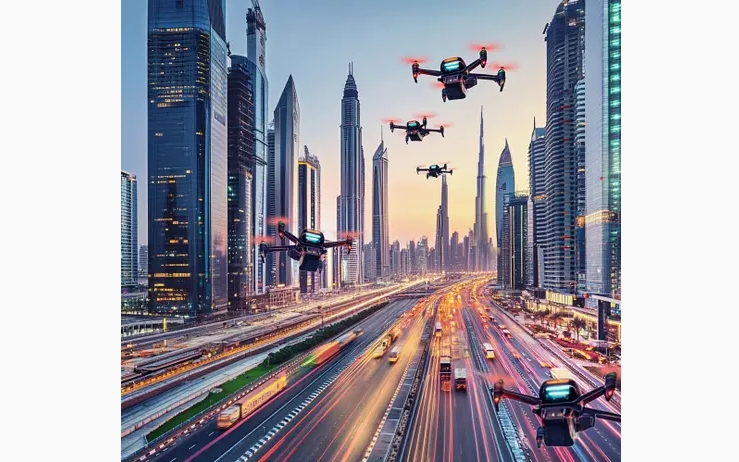The United Arab Emirates (UAE) has begun an ambitious project aimed at revolutionising urban transportation, with plans for piloted and autonomous air taxis and cargo drones. The project, which involves air corridor mapping and the development of a regulatory framework, is a significant part of the UAE’s broader vision to lead the future of mobility.
In collaboration with the General Civil Aviation Authority (GCAA) and the Advanced Technology Research Council (ATRC), the UAE has enlisted the help of two key entities—the Technology Innovation Institute (TII) and ASPIRE—to provide technical expertise and airspace management. This pioneering effort will reshape how people and goods move through urban spaces, making the UAE a global leader in advanced air mobility (AAM).
The mapping of aerial corridors for air taxis and cargo drones is set to be completed within the next 20 months. The project aims to connect key international airports, iconic landmarks, and urban centres in the UAE, creating a seamless and efficient transport network that eases congestion on the nation’s roads.
His Excellency Saif Mohammed Al Suwaidi, Director General of the GCAA, highlighted the importance of this initiative, stating: “Air corridor mapping for piloted and autonomous air taxis and drones is a crucial milestone that will enable the seamless implementation of Advanced Air Mobility into the UAE’s infrastructure. This initiative ensures the safe and efficient adoption of air mobility, delivering transformative solutions to urban transport and paving the way for a smarter, more connected future.”
The UAE’s forward-thinking approach to urban transportation will be supported by the TII’s expertise in airspace management, which will ensure the safe integration of both piloted and autonomous air taxis and drones into urban environments. The new air corridors are designed to alleviate pressure on traditional transportation systems and improve connectivity.
Dr. Najwa Aaraj, CEO of TII, expressed excitement about the partnership, saying: “This transformative collaboration with GCAA is reshaping the future of urban transportation. By advancing airspace management and integrating piloted and autonomous air taxis and cargo drones, we are not only enhancing urban connectivity but also driving sustainable and accessible mobility solutions that will benefit future generations.”
ASPIRE’s Stephane Timpano also praised the initiative, noting that it addresses real-time urban mobility challenges. He added: “This initiative directly supports sustainable economic growth by creating a flexible and diverse transport system that eases pressure on urban infrastructure and fosters smarter, more resilient cities.”
The announcement of the air corridor mapping project came during the World Governments Summit 2025, underscoring the UAE’s commitment to innovation and sustainability.
Advanced Air Mobility (AAM) refers to the use of automated aircraft in urban and suburban settings to provide transport solutions for people and goods. With TII leading the development of technical aspects such as autonomous systems and air traffic management, and ASPIRE working on creating a network of stakeholders, the UAE aims to create a comprehensive regulatory framework that ensures both safety and operational efficiency.
Prof. Enrico Natalizio, Chief Researcher at TII, elaborated on the technical challenges, saying: “We are developing AI-powered control, vision, and communication algorithms for autonomous systems that enable real-time decision-making. This technology will optimise AAM routes, ensure collision avoidance, and integrate seamlessly with urban airspace.”
The initiative places the UAE at the forefront of global efforts to develop safe and efficient urban air mobility systems, setting a benchmark for other nations to follow.

